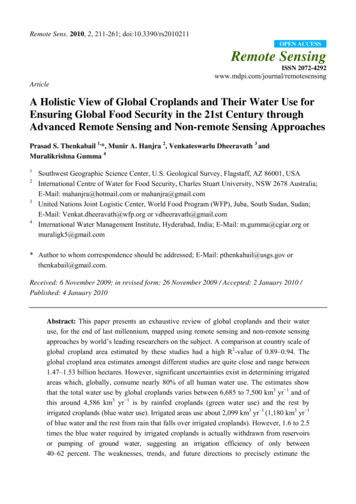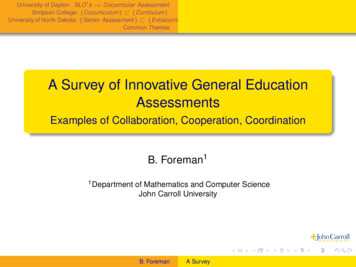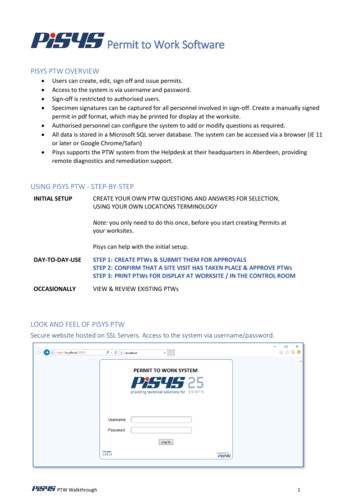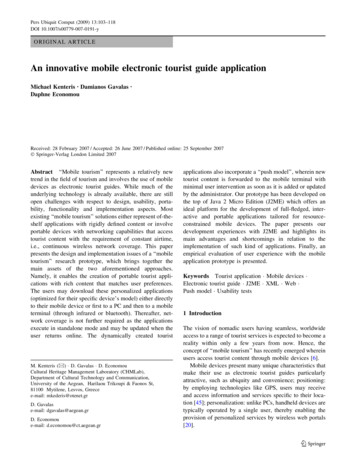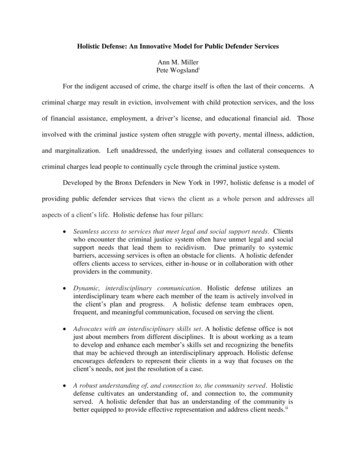
Transcription
Holistic Defense: An Innovative Model for Public Defender ServicesAnn M. MillerPete WogslandiFor the indigent accused of crime, the charge itself is often the last of their concerns. Acriminal charge may result in eviction, involvement with child protection services, and the lossof financial assistance, employment, a driver’s license, and educational financial aid. Thoseinvolved with the criminal justice system often struggle with poverty, mental illness, addiction,and marginalization. Left unaddressed, the underlying issues and collateral consequences tocriminal charges lead people to continually cycle through the criminal justice system.Developed by the Bronx Defenders in New York in 1997, holistic defense is a model ofproviding public defender services that views the client as a whole person and addresses allaspects of a client’s life. Holistic defense has four pillars: Seamless access to services that meet legal and social support needs. Clientswho encounter the criminal justice system often have unmet legal and socialsupport needs that lead them to recidivism. Due primarily to systemicbarriers, accessing services is often an obstacle for clients. A holistic defenderoffers clients access to services, either in-house or in collaboration with otherproviders in the community. Dynamic, interdisciplinary communication. Holistic defense utilizes aninterdisciplinary team where each member of the team is actively involved inthe client’s plan and progress. A holistic defense team embraces open,frequent, and meaningful communication, focused on serving the client. Advocates with an interdisciplinary skills set. A holistic defense office is notjust about members from different disciplines. It is about working as a teamto develop and enhance each member’s skills set and recognizing the benefitsthat may be achieved through an interdisciplinary approach. Holistic defenseencourages defenders to represent their clients in a way that focuses on theclient’s needs, not just the resolution of a case. A robust understanding of, and connection to, the community served. Holisticdefense cultivates an understanding of, and connection to, the communityserved. A holistic defender that has an understanding of the community isbetter equipped to provide effective representation and address client needs.ii
Holistic defense on the Flathead Reservation.After receiving technical assistance from the Bronx Defenders in 2011, the TribalDefenders for the Confederated Salish and Kootenai Tribes became the first office in Montana,and the first tribal office in the country, to adopt holistic defense. In fact, the model blendedparticularly well in Indian country because like holistic defense, traditional tribal justice systemswere based on a holistic philosophy with restorative principles that viewed problems in theirentirety, promoted resolution of underlying issues, and engaged the community.iiiWith a staff of ten, the Tribal Defenders redefined staff positions to form aninterdisciplinary team to offer client-centered, holistic defense services. The Tribal Defendersidentified client needs and implemented services to address those needs.Finding a high incidence of mental illness and chemical dependency among their clientsthat significantly contribute to a high rate of recidivism, the Tribal Defenders collaborate withTribal Health and the University of Montana to offer in-house psychology services for theirclients.Clinical psychology doctoral students provide assessment, therapy, and psycho-educational groups at the Tribal Defenders’ office and in the tribal jail. The doctoral studentsalso provide team training on psychological issues and program evaluation of the TribalDefenders’ holistic practice.Learning that clients are more likely to be successful with the support of their tribalcommunity, the Tribal Defenders work with the Selis Qlispe and Kootenai culture committees torecruit volunteers to serve as cultural mentors. The mentors counsel clients to reconnect to theirtribal culture and provide culturally relevant dispute resolution.Recognizing that many of their clients were driving on suspended driver’s licenses out ofthe pure necessity to get to work, health care appointments, and court appearances, the Tribal
Defenders assigned an advocate to assist clients to learn why their licenses were suspended andhow to get them restored. To date, 200 of the Tribal Defenders’ clients have restored theirdriver’s licenses.Discovering that a large number of litigants in tribal court were pro se, the TribalDefenders developed standardized forms and assist litigants in drafting their own pleadings. TheTribal Defenders also collaborate with the Alexander Blewett III School of Law. Interns fromthe law school assist with community outreach projects, represent clients in criminal cases, andprovide mediation to litigants in tribal court.The Tribal Defenders also offer a sobriety support group, Salish language classes,community service projects for clients to work off fines, and walk-in services that range fromemergency psychological interventions to providing people with information and referrals forservices.In 2016, the Tribal Defenders started the Flathead Reservation Reentry Program, offeringlegal, psychological, and case-management services to tribal members returning to the FlatheadReservation from tribal, county, and state incarceration. As a part of the reentry program, theTribal Defenders’ psychologists developed the only case management tool that measuresresiliency factors and level of risk to reoffend for a Native American population.iv By the end ofits second year, recidivism was down to 32% – a significant reduction considering that 100% ofthe 319 clients served were recidivists when they entered the reentry program.vNew holistic defense projects in Montana.In 2017, the Montana legislature passed House Bill 89,vi modeled after the TribalDefenders’ holistic defense practice. House Bill 89 requires the Montana Office of the PublicDefender to implement holistic defense pilot projects. Four pilot projects in Billings, Kalispell,
Missoula, and Bozeman are forming interdisciplinary teams of investigators, social workers,defense lawyers, and paralegals who collaborate with service providers and implement holisticdefense practices that will result in positive life outcomes for their clients, lower recidivism rates,and safer communities.In 2018, Ann Miller, Maylinn Smith, and James Taylor founded the Louise Burke Centerfor Holistic Representation (LBC), a 501(c)(3) non-profit corporation.viiRecognizing theimpacts of historical trauma, past federal policies, structural racism, and their effects on tribalcommunities and American Indian people, the LBC will take a multifaceted approach toreducing the current disproportionate representation of American Indian people in legal actionsinitiated by governmental entities.The LBC will be located in the Missoula area and willexpand upon the holistic defense model developed by the Tribal Defenders.Holistic defense solves problems.Holistic defense eliminates a silo approach to legal representation and promotes problemsolving. It fosters innovation and a positive outlook for its practitioners. Holistic defensepromotes procedural justice. That is, if litigants believe the process is fair, they are more likelyto comply with court orders and have success.viii Holistic defense results in better life outcomesfor public defender clients, a lesser likelihood of going to jail, and shorter jail sentences.ixPublic defender clients are much more than the crimes they are accused of committing.They come from families and communities. They often have unresolved mental illness oraddiction that brought them into the criminal justice system. They have stories of poverty andtrauma, but also resilience. Holistic defense is client-centered, works with the accused in thecontext of their stories, builds upon their strengths, and assists them to access resources relevant
to their rehabilitative needs. In that way, public defenders practicing holistic defense not onlyhelp their clients to be more successful but also contribute to a more positive, safer community.iAnn M. Miller is the Managing Attorney for the Tribal Defenders Office of the Confederated Salish and KootenaiTribes on the Flathead Reservation. During her tenure, the Defenders Office implemented an innovative in-house service forclients with co-occurring mental health and chemical dependency, a reentry program, and adopted a holistic defense practice withassistance from the Center for Holistic Defense sponsored by the Bronx Public Defenders Office in New York. Ms. Millerprovides technical assistance to Montana OPD’s four holistic defense pilot projects.Pete Wogsland is a staff attorney at the Office of the Code Reviser for the Washington State Legislature. He haswritten several grant proposals for the Tribal Defenders holistic program, including the application that resulted in technicalassistance from the Bronx Defenders’ Center for Holistic Defense in 2011.The Bronx Defenders’ website, https://www.bronxdefenders.org/holistic/defense/; see also, Steinberg,Robin, Heeding Gideon’s Call in the Twenty-First Century: Holistic Defense and the New Public DefenderParadigm, 70 Wash. & Lee L. Rev. 961 (Spring, 2013).iiiiiMelton, Ada Pecos Indigenous Justice Systems and Tribal Society (2005).Hansen, C., Swaney, G., Fox, D., Miller, A., Billedeaux, S., Matt, C., Predicting Recidivism for NativeAmerican Offenders on a Montana Reservation: Reporting on Risk and Resilience Factors (April, 2018).iiivOutcome data at the completion of the second year of the Flathead Reservation Reentry Program shows of319 clients served, 32% were convicted of a new offense during the time of service – a 68% reduction fromapproximately 100% recidivism among reentry clients when entering the program. 38.5% had new offenses plustechnical violations of sentencing conditions. Data also shows reentry clients’ re-incarceration rate for conviction ofnew offenses and revocations of sentences is only 11%.viCodified as 47-1-126, MCA.viiLouise Caye Burke was a traditional Kootenai elder and member of the Confederated Salish and KootenaiTribes. As the mother of twelve children, she understood the importance of family and relationships within tribalcommunities. During her more than thirty years sitting as a tribal judge, she routinely demonstrated a depth ofwisdom and strength of character that enabled her to effectively utilize customs, traditions, compassion, and a nononsense approach. The LBC is named in her honor with permission from the Burke family.viiiixTyler, Tom R., Why People Obey the Law, New Haven, CT: Yale University Press (1990).Hager, Eli, The Courts See a Crime. These Lawyers See a Whole Life, the Marshall Project (2018). Thearticle cites a comparative study of the Bronx Defenders’ services done by the RAND Corporation and theUniversity of Pennsylvania Law School.
Developed by the Bronx Defenders in New York in 1997, holistic defense is a model of providing public defender services that views the client as a whole person and addresses all aspects of a client’s life. Holistic defense has four pillars: Seamless access to services




